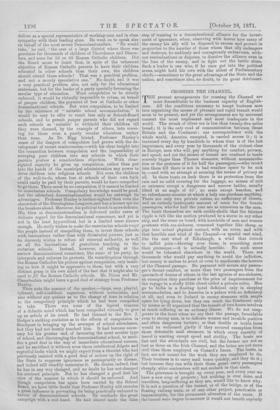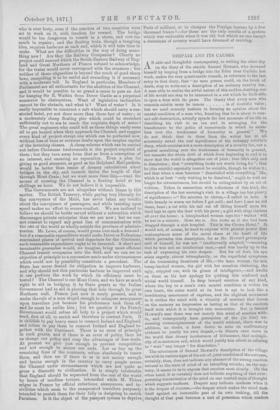CROSSING THE CHANNEL. T HE present arrangements for crossing the Channel
are most discreditable to the business capacity of English- men. All the conditions necessary to tempt business men into organizing the means of pleasant and rapid transit would seem to be present, and yet the arrangements are by universal consent the most unpleasant and most inadequate in the world. The streak of silver sea is less than twenty-five miles broad ; it is the only road of communication between Great Britain and the Continent ; our correspondence with the whole world, America excepted, is carried across it ; it is traversed every day by hundreds to whom time is of the last importance, and every year by thousands of the richest class in Europe, men who will pay anything for comfort, privacy, and speed, and yet the means of transit are confined to boats scarcely bigger than Thames steamers, without accommoda- tion or the pretence of it for half the passengers,—who crowd into them till there is not in bad weather space to be sick in,—and with no attempt at securing the means of privacy at all. In these boats on deck there is no protection from the rain and no solid covering for the luggage, no means of exit or entrance except a dangerous and narrow ladder, usually tilted at an angle of 45°, no seats except benches, and no refreshment-counter at which a lady can purchase anything. There are only two private cabins, no sufficiency of closets, and an entirely inadequate amount of room for the female passengers, who for half the year are as numerous as the men. The boats themselves are such cockle-shells that the faintest ripple is felt like the motion produced by a storm in any other ship, and the scene on board, with hundreds of men and women prostrate with sea-sickness, crammed together like sheep or pigs into actual physical contact, with no cover, and with that horrible east wind of the Channel—a special east wind, like the east wind of Edinburgh, a wind that intends to inflict pain—blowing over them, is something more than grotesque,—it is actually horrible. No such scene would be tolerated elsewhere in the world. There are thousands who would pay anything to avoid the infliction, but money is useless to avert or even to ameliorate the horrors of the Channel passage. No payment will secure any passen- ger's decent comfort, or more than two passengers from the spectacle of dozens of others in the last agonies of sea-sickness, an exemption they purchase at the price of imprisonment for the voyage in a stuffy little closet called a private cabin. Men go to India in a floating hotel deficient only in sleeping accommodation, and to America in a palace with no deficiency at all, and even to Ireland in roomy steamers with ample space for lying down, but they can roach the Continent only by means so ill organized that the transit of two hours involves as much suffering as an ordinary illness. We do not exag- gerate in the least when we say that the passage, formidable even to strong men, is to delicate women and invalids positive and often dangerous torture ; or that double or treble fares would be welcomed gladly if they secured exemption from
those detestable mail steamers, in which every amenity of travel is wanting except speed and civility. The boats are fast and the attendants are civil, but the former are not so fast as those on the Irish Channel, and the latter are not more civil than those employed on Cunard's liners. The boats, in fact, are not meant for the work they are employed to do. Their business is to carry mail boxes quickly, and they do it ; but because they can with their State grant carry passengers cheaply, abler contractors will not embark in that trade. The grievance is brought up every year, and every year we have a new crop of projects ; but nothing is ever done, and travellers, long-suffering as they are, would like to know why. It is not a question of the tunnel, or of the bridge, or of the floating railway train, or of any other project, practicable or impracticable, for the permanent alteration of the route. If i the tunnel were begun to-morrow it would not benefit anybody
who is over forty, even if the convicts of two countries were set to work on it, with freedom for reward, The bridge would be too dangerous to vessels in a storm, and cost too much in repairs ; and the floating train, though a tempting idea, requires harbours at each end, which it will take time to make. What are the difficulties in the way of doing some- thing now Are they the Railway Companies ? Clearly no project could succeed which the South-Eastern Railway of Eng- land and Great Northern of France refused to acknowledge, for the trains would never correspond with the steamers ; but neither of those oligarchies is beyond the reach of good sharp laws, compelling it to be useful and rewarding it if necessary with a moderate toll. In England in particular, Members of Parliament are all enthusiastic for the abolition of the Channel, and it would be possible in so grand a cause to pass an Act for hanging Sir E. Watkin from Dover Castle as a perpetual scarecrow to obstructives. Want of legislative inclination cannot be the obstacle, and what is V Want of water ? Is it really impossible to construct a raft which should carry a one- storied hotel, yet not draw more than three feet of water ; or a moderately cheap floating pier which could be stretched sufficiently out to sea to reach the requisite depth of water ? The great engineers who could tell us these things easily seem all to get heated when they approach the Channel, and suggest every kind of project except one which can be perfected now, without loss of time or extreme drafts upon the surplus capital of the investing classes. A cheap scheme which can be carried out before Christmas twelvemonth is the project required of them ; but they turn away from that as from a conception of no interest, and ensuring no reputation. Even a plan for giving us good steamers, as good as the Holyhead Mail packets, would be better than reams of dreamy calculations about bridges in the sky, and tunnels thrice the length of that through Mont Cenis ; but we want more than this,—want the means of crossing the Channel in a floating hotel at ten shillings an hour. We do not believe it is impossible. The Governments are not altogether without blame in this matter. The British Treasury, while paying very liberally for the conveyance of the Mails, has never taken any trouble about the conveyance of passengers, and while insisting upon speed makes no effort to secure comfort. We are inclined to believe we should be bettbr served without a subvention which discourages private enterprise than we are now ; but we can- not consent to regard any great lino of communication with the rest of the world as wholly outside the province of adminis- tration. Mr. Lowe, of course, would groan over such a demand ; but if a reasonable expenditure would make Dover or Folkestone convenient places of arrival and departure for the Continent, such reasonable expenditure ought to be incurred. A short and terminable guarantee would, we imagine, bring most efficient Channel transit companies into the field, and we can see no objection of principle to a concession made under circumstances which could not by possibility constitute a precedent. The State has never denied its obligation to improve harbours, and why should not this particular harbour be improved until it can perform the work by which its efficiency must be tested ? The Channel is our Mont Cenis, and we have as much right to aid in bridging it by State grants as the Italian Government had to aid in piercing that hole through its great Northern wall. France just now is sorely pressed, and is under the rule of a man stupid enough to reimpose annoyances upon travellers just because his predecessor took them off, and he must be unlike him ; but we question if the French Government would refuse all help to a project which would tend, first of all, to enrich and therefore to content Paris. It is childish to pay heavy sums to connect Ireland and England, and refuse to pay them to connect Ireland and England to- gether with the Continent. There is no error of principle in such grants, and if there is an error of policy, then let us change our policy and reap the advantages of free trade. At present we give just enough to prevent competition and not enough to secure our ends. Let us buy up the remaining time of the contracts, refuse absolutely to renew them, and then see if there is or is not money enough . and brains enough the country to carry people across the Channel under circumstances which are not quite so gross a discredit to civilization. It is simply intolerable that England should be separated from the rest of the world by hours of needless torture, intensified while M. Thiers reigns in France by official extortions, annoyances, and in- civilities which seem to the exasperated travellers purposely intended to punish them for their folly in designing to enrich Parisians. Is it the object of the passport system to deprive Paris of millions, or to cheapen the Foreign bureau by a few thousand francs ?—for those are the only results of a system which was endurable when it was old, but which no one except a statesman of seventy would have dreamed of reviving.



































 Previous page
Previous page